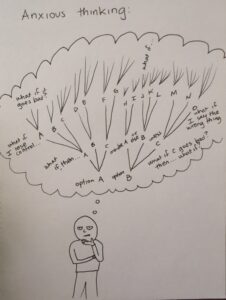Anxiety Counseling
 Everyone experiences "anxiety" to some degree, and it is a natural part of the human experience. There's "good anxiety," like the motivating and exciting feeling one gets when performing, playing, working on an enjoyable task. And then there's the other, "the bad anxiety," the kind that leads to procrastination, overwhelm, crushing and de-motivating pressure, excessive self-criticism, hopelessness. When anxiety becomes excessive or persistent, it can interfere with daily life and cause significant distress. Anxiety is often accompanied by physical symptoms, such as increased heart rate, sweating, and rapid breathing -- the "butterflies" go from fun to debilitating. These symptoms are the body's natural response to perceived threat or danger, and they are part of the body's "fight or flight" response. Another example of "good anxiety" is when there's smoke in the room, the building may be on fire, and it's time to run -- sometimes, anxiety keeps us safe. Other times, the body will tell us "there's a fire" when there's no fire. This looks like, it's 2AM and I can't sleep, I am with my family but my mind is racing about work, I can't stop thinking about if I said the wrong thing to my friend...
Everyone experiences "anxiety" to some degree, and it is a natural part of the human experience. There's "good anxiety," like the motivating and exciting feeling one gets when performing, playing, working on an enjoyable task. And then there's the other, "the bad anxiety," the kind that leads to procrastination, overwhelm, crushing and de-motivating pressure, excessive self-criticism, hopelessness. When anxiety becomes excessive or persistent, it can interfere with daily life and cause significant distress. Anxiety is often accompanied by physical symptoms, such as increased heart rate, sweating, and rapid breathing -- the "butterflies" go from fun to debilitating. These symptoms are the body's natural response to perceived threat or danger, and they are part of the body's "fight or flight" response. Another example of "good anxiety" is when there's smoke in the room, the building may be on fire, and it's time to run -- sometimes, anxiety keeps us safe. Other times, the body will tell us "there's a fire" when there's no fire. This looks like, it's 2AM and I can't sleep, I am with my family but my mind is racing about work, I can't stop thinking about if I said the wrong thing to my friend...
Anxiety can take many different forms, including generalized anxiety disorder, panic disorder, social anxiety disorder, obsessive-compulsive disorder, and post-traumatic stress disorder. Each type of anxiety disorder has specific symptoms and characteristics, and it's important to identify which type of anxiety you may be experiencing. For many, historical factors like traumatic experiences, disruptions in family of origin and early caregiving, and lack of emotional attunement can contribute to lifelong experiences of increased anxiety symptoms.
There are many other factors that can contribute to the development of anxiety, including genetics, brain chemistry, life experiences, and environmental factors. Some people may be more prone to anxiety due to their biology or upbringing, while others may develop anxiety in response to specific life events or stressors.
The good news is that anxiety is treatable, and there are many effective treatments available, including therapy, medication, and lifestyle changes. In therapy, you and your counselor would work together to identify the specific causes of your anxiety and develop a personalized treatment plan to help you manage your symptoms. This can take the form of developing a mindfulness practice, making changes where change is possible (e.g. career, thinking patterns, substance use, etc), and building a positive support network.
Therapy can help you learn new coping strategies to manage your anxiety, challenge negative thought patterns that contribute to your anxiety, and identify and change behaviors that may be making your anxiety worse. By working together in therapy, you and your therapist can help you develop the skills you need to manage your anxiety and improve your overall well-being.
It's important to remember that seeking help for anxiety is a sign of strength, not weakness. Sometimes "anxiety about anxiety," or "anxiety about talking about anxiety" gets in the way of doing something different. For many, reducing anxiety can feel like giving up control, letting my guard down, like I'm going into work unprepared, like giving up "the thing that has kept me safe for so long." It takes courage to acknowledge that you need help, whether it's anxiety or some other mental health challenge, and we at Progress Counseling commend you for taking the first step towards healing.
At Progress Counseling, we understand that anxiety can be a debilitating condition that affects every aspect of your life, including your relationships, work, and personal well-being. Our counseling services are here to provide you with the support and guidance you need to manage your anxiety and regain control of your life.
Our team of experienced and compassionate counselors is dedicated to providing you with a safe and supportive environment to explore your thoughts and emotions. We offer a variety of counseling services tailored to meet your specific needs, including a variety of culturally responsive, specially trained, and modalities -- these modalities include SFBT, CBT, EMDR, psychodynamic, and other trauma-informed, evidence-based methods. We understand that anxiety can be a complex and multi-faceted condition, and we work closely with you to develop a personalized treatment plan that addresses your unique needs.
At Progress Counseling, we are committed to creating a safe and supportive environment where you can explore your thoughts and emotions and develop the skills you need to manage your anxiety. We are here to support you on your journey to healing and recovery. If you are ready to take the first step towards managing your anxiety, please contact us to schedule a consultation with one of our experienced counselors. We look forward to working with you and helping you achieve your goals.
Still have questions about therapy?
It's important to find a therapist you feel comfortable with. Contact us for more information.
